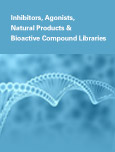| Cat. No. |
Product Name |
Information |
| PC-42430 |
CHIR-99021 trihydrochloride
GSK-3 inhibitor
|
CHIR-99021 (Laduviglusib) trihydrochloride is a potent, specific GSK-3 inhibitor with IC50 of 5 nM and 10 nM for GSK3β and GSK3α, respectively. |
| PC-42429 |
CHIR-99021 monohydrochloride
GSK-3 inhibitor
|
CHIR-99021 (Laduviglusib) monohydrochloride is a potent, specific GSK-3 inhibitor with IC50 of 5 nM and 10 nM for GSK3β and GSK3α, respectively. |
| PC-42428 |
CHIR-99021
GSK-3 inhibitor
|
Laduviglusib (CHIR-99021, CT99021) is a potent, specific GSK-3 inhibitor with IC50 of 5 nM and 10 nM for GSK3β and GSK3α, respectively. |
| PC-42628 |
AR-A014418
GSK-3β inhibitor
|
AR-A014418 is a potent, specific ATP-competitive inhibitor of GSK-3β with Ki/IC50 of 38/104 nM. |
| PC-42787 |
TDZD-8
GSK3β inhibitor
|
TDZD-8 (GSK-3β Inhibitor I, NP 01139) is a potent, selective, non-ATP competitive GSK-3β inhibitor with IC50 of 2 uM. |
| PC-45724 |
Indirubin-3-monoxime
GSK3β inhibitor
|
Indirubin-3'-monoxime is a potent GSK3β inhibitor with IC50 of 22 nM, prevents tau phosphorylation both in vitro and in vivo. |
| PC-42083 |
CP21R7
GSK3β inhibitor
|
CP21R7 is a high-affinity, selective GSK3β inhibitor with IC50 of 1.8 nM, activates canonical Wnt signaling. |
| PC-42674 |
TWS119
GSK3β inhibitor
|
TWS119 is a potent GSK-3β inhibitor with IC50 of 30 nM in a cell-free assay. |
| PC-42664 |
BIO
GSK-3 inhibitor
|
BIO (6BIO, GSK-3 Inhibitor IX, MLS 2052) is a cell-permeable derivative of 6-bromoindirubin that displays selective inhibition of GSK-3 with IC50 of 5 nM. |
| PC-25724 |
Pentagalloylglucose
TRMT61A inhibitor
|
Pentagalloylglucose is an orally active gallic tannin compound, induces cell apoptosis and autophagy through the GSK3β/β-catenin pathway, inhibits UBE2T-mediated p53 ubiquitination, upregulates p53, downregulates RRM1/RRM2 in pancreatic cancer organoids, also is a specific TRMT61A inhibitor. |
| PC-25363 |
KY19382
Wnt/beta-catenin agonist, CXXC5-Dvl inhibitor
|
KY19382 is a small molecule activator of Wnt/β-catenin signalling, effectively inhibits both GSK3β kinase activity and CXXC5-DVL interaction with IC50 of 10 nM and 19 nM respectively. |
| PC-25343 |
GSK-3β inhibitor G3I
GSK-3β inhibitor
|
GSK-3β inhibitor G3I is a specific GSK-3β inhibitor, inhibits nitric oxide (NO) production in LPS-stimulated macrophages with IC50 of 3.65 uM. |













